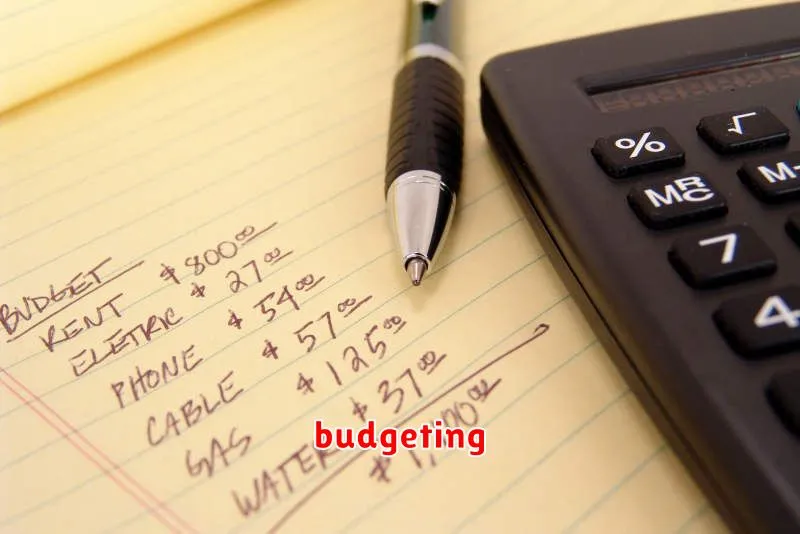Feeling overwhelmed by your finances? Are you constantly struggling to make ends meet? You’re not alone. Many people find themselves in a similar situation, struggling to manage their money effectively. But don’t despair! Mastering the art of budgeting is a powerful tool that can help you gain control of your finances and achieve your financial goals. A well-crafted budget can help you track your income and expenses, identify areas where you can save money, and ultimately achieve financial freedom.
In this comprehensive guide, we’ll delve into the essential principles of budgeting, exploring proven strategies that will empower you to take control of your money. From setting realistic financial goals to developing effective spending habits, we’ll cover all the key aspects of successful budgeting. By following our step-by-step instructions and practical tips, you’ll gain the knowledge and confidence to create a budget that works for you and transform your financial future.
Why Budgeting is Essential
A budget is a financial plan that helps you track your income and expenses. It is an essential tool for achieving your financial goals, whether you want to save for a down payment on a house, pay off debt, or simply have more financial freedom.
By creating a budget, you can see exactly where your money is going and make informed decisions about how to spend it. This can help you avoid overspending and ensure that you have enough money for the things that are most important to you. Budgeting also helps you to:
- Save money: By knowing where your money is going, you can identify areas where you can cut back and save more.
- Reduce debt: A budget can help you prioritize debt payments and develop a plan to pay off your balances faster.
- Reach your financial goals: Whether you’re saving for retirement, a down payment on a house, or a dream vacation, a budget can help you stay on track and make progress towards your goals.
- Gain financial control: A budget can help you feel more in control of your finances and reduce stress about money.
In conclusion, creating and sticking to a budget is an essential step towards financial well-being. It empowers you to make informed financial decisions, manage your money wisely, and achieve your financial goals.
How to Create a Monthly Budget
Creating a monthly budget is essential for taking control of your finances. A budget helps you track your income and expenses, identify areas where you can save money, and achieve your financial goals. Here’s a step-by-step guide on how to create a monthly budget:
1. Track Your Income and Expenses: Begin by meticulously tracking your income and expenses for a month. Use a spreadsheet, budgeting app, or a simple notebook. Note every dollar that comes in and every dollar that goes out. This will give you a clear picture of your current financial situation.
2. Categorize Your Expenses: After tracking your expenses, categorize them into different groups such as housing, food, transportation, entertainment, and so on. This will help you identify areas where you spend the most and where you might have room for improvement.
3. Create a Budget Template: Create a budget template or use a budgeting tool to outline your planned income and expenses. List all your income sources and allocate each dollar to specific categories. Be realistic and allocate funds for both essential and non-essential expenses.
4. Adjust and Review: Your budget is not set in stone. Review your budget regularly and adjust it as needed. Life happens, and your expenses may fluctuate. By being proactive and making adjustments, you can keep your budget on track.
5. Stick to Your Budget: The key to successful budgeting is consistency. Make a conscious effort to stick to your budget each month. Be disciplined with your spending and avoid impulse purchases. Monitor your progress and make adjustments when necessary.
Tips for Sticking to Your Budget
Sticking to a budget can be challenging, but it’s essential for achieving financial stability. Here are some practical tips to help you stay on track:
Track Your Spending: Understanding where your money goes is crucial. Use budgeting apps, spreadsheets, or a notebook to record every expense. This provides valuable insights into your spending habits.
Set Realistic Goals: Don’t try to drastically cut everything at once. Start with small, achievable goals. For example, you might aim to reduce dining out expenses by 10% or cook more meals at home.
Automate Savings: Set up automatic transfers to your savings account. This ensures you’re consistently putting money aside, even if you forget or feel tempted to spend it.
Create a Spending Plan: Allocate specific amounts for different categories (e.g., groceries, entertainment, transportation). This helps you prioritize spending and avoid overspending in any one area.
Avoid Impulse Purchases: Before buying something, ask yourself if it’s a need or a want. Give yourself a “cooling off” period before making big purchases to ensure you truly need it.
Review and Adjust: Regularly review your budget and make adjustments as needed. Your financial situation may change over time, so staying flexible is key.
Find Support: Share your budget goals with a friend, family member, or financial advisor. Accountability can help you stay motivated and on track.
Sticking to a budget takes effort and discipline, but the rewards are well worth it. By implementing these tips, you can gain control over your finances and work towards your financial goals.
How to Track Your Expenses
Tracking your expenses is a crucial step in mastering the art of budgeting. It gives you a clear picture of where your money is going, allowing you to identify areas where you can cut back and save more. Here are some effective methods to track your expenses:
Use a Budgeting App
Budgeting apps like Mint, Personal Capital, and YNAB (You Need a Budget) automatically track your transactions from linked bank accounts and credit cards. They categorize your expenses, provide insightful reports, and help you set financial goals. These apps are convenient and often offer features like expense alerts and budget breakdowns.
Spreadsheet
If you prefer a more manual approach, a simple spreadsheet can be a great tool. Create columns for date, category (e.g., groceries, dining, entertainment), and amount. Regularly update the spreadsheet with your spending data. This method offers flexibility and allows you to customize your categories to fit your needs.
Envelope System
For a more hands-on approach, the envelope system is a classic budgeting method. Allocate cash for specific categories (e.g., groceries, entertainment) and store it in labeled envelopes. As you spend, withdraw cash from the appropriate envelope. This method can help you stay within your budget and visualize your spending.
Track Your Expenses Consistently
Consistency is key when tracking your expenses. Make it a habit to record every transaction, no matter how small. You can use a notebook, a mobile app, or any method that works best for you. The more data you collect, the more accurate and insightful your financial picture will become.
By diligently tracking your expenses, you gain valuable insights into your spending habits. This information empowers you to make informed decisions about your finances, set realistic budgets, and ultimately take control of your financial well-being.
Using Apps and Tools for Budgeting
Budgeting apps and tools can be incredibly helpful in managing your finances. They offer a variety of features that can make the process easier and more effective.
Tracking Expenses: Most budgeting apps allow you to track your spending by linking to your bank accounts or credit cards. This provides a detailed overview of your spending habits, making it easier to identify areas where you can cut back.
Setting Goals: Many apps let you set financial goals, such as saving for a down payment or paying off debt. You can then track your progress towards these goals, which can be motivating and help you stay on track.
Creating Budgets: Budgeting apps can help you create a monthly budget by categorizing your expenses and allocating funds to different areas. This can help you stay within your spending limits and make informed financial decisions.
Analyzing Spending: These apps often provide detailed spending reports that show you where your money is going. This can help you identify areas where you may be overspending and find opportunities to save.
Some popular budgeting apps include:
- Mint
- YNAB (You Need a Budget)
- Personal Capital
- EveryDollar
These apps offer a variety of features and can be customized to suit your individual needs. By using a budgeting app, you can gain valuable insights into your spending habits, set financial goals, and take control of your finances.
The Importance of Financial Discipline
Financial discipline is the cornerstone of a secure financial future. It involves making conscious and deliberate decisions about your money, prioritizing needs over wants, and consistently adhering to a budget. Discipline empowers you to take control of your finances, achieve your financial goals, and avoid falling into debt.
When you embrace financial discipline, you gain the ability to save and invest effectively. By sticking to your budget, you can allocate money towards your future aspirations, such as retirement planning, homeownership, or educational pursuits. Moreover, it cultivates a sense of responsibility towards your financial well-being, fostering a mindset of mindful spending and long-term prosperity.
The absence of financial discipline can lead to a cycle of reckless spending, debt accumulation, and financial instability. It’s crucial to develop this habit early on in life to reap the benefits of financial security and independence.
How to Set Realistic Financial Goals
Setting realistic financial goals is crucial for achieving financial success. It’s about setting targets that are both challenging and achievable, motivating you to take action without feeling overwhelmed. To set realistic financial goals, consider the following steps:
1. Define Your Financial Situation: Start by understanding your current financial position. Assess your income, expenses, assets, and debts. This will provide a clear picture of where you stand and what you can realistically achieve.
2. Identify Your Financial Goals: Determine what you want to achieve financially. Consider both short-term and long-term goals. Short-term goals might include paying off a credit card or building an emergency fund. Long-term goals could be saving for retirement or purchasing a home.
3. Make Goals Specific, Measurable, Achievable, Relevant, and Time-Bound (SMART): SMART goals are more likely to be accomplished. A specific goal might be “Save $1,000 in the next six months,” while a measurable goal could be “Reduce monthly expenses by $200.” Make sure your goals are achievable, relevant to your needs, and have a defined timeframe.
4. Prioritize Your Goals: After defining your goals, prioritize them based on their importance and urgency. This will help you allocate your resources effectively and focus on the most critical objectives.
5. Break Down Goals into Smaller Steps: Overwhelming goals can be discouraging. Break down large goals into smaller, manageable steps. This will make progress feel more attainable and keep you motivated.
6. Review and Adjust Your Goals Regularly: Life changes, and so should your financial goals. Periodically review your progress and adjust your goals accordingly. Be flexible and adapt to new circumstances as they arise.
By setting realistic financial goals, you can create a clear path to financial success. Remember, it’s not about reaching a destination overnight but about taking consistent steps in the right direction. With focused effort and commitment, you can achieve your financial aspirations and secure a brighter future.
The Benefits of Zero-Based Budgeting
Zero-based budgeting is a method that requires you to start from scratch every month, allocating every dollar to a specific purpose. This approach differs from traditional budgeting, where you simply carry over the previous month’s spending.
Here are some benefits of zero-based budgeting:
- Increased Financial Awareness: Zero-based budgeting forces you to analyze your spending habits, identify unnecessary expenses, and prioritize your financial goals.
- Improved Financial Discipline: By allocating every dollar, you become more conscious of your spending and less likely to overspend.
- Reaching Financial Goals Faster: You can direct your money towards your goals, such as saving for a down payment on a house or paying off debt, by carefully allocating funds.
- Reduced Debt: Zero-based budgeting helps you identify areas where you can cut back and reduce debt faster.
- Increased Savings: By allocating funds for savings, you can achieve your savings goals more effectively.
Common Budgeting Mistakes to Avoid
Budgeting is an essential part of managing your finances effectively, but even seasoned savers can fall prey to common pitfalls. Understanding and avoiding these mistakes can significantly improve your financial well-being. Here are some of the most frequent budgeting errors to watch out for:
1. Underestimating Expenses: A common mistake is underestimating your actual spending. Keep track of every dollar you spend for a month to accurately assess your financial needs. Use budgeting apps or spreadsheets to track expenses across different categories, such as groceries, transportation, entertainment, and more.
2. Not Having a Budget: You can’t manage what you don’t track. Creating a detailed budget outlines your income and expenses, allowing you to see where your money goes. This provides a roadmap for reaching your financial goals.
3. Overspending on Wants: Differentiating between needs and wants is crucial. While it’s okay to enjoy occasional luxuries, prioritize your needs, such as rent, utilities, groceries, and debt payments. Allocate a specific amount to wants and stick to it.
4. Ignoring Debt: Ignoring debt can lead to snowballing interest and hurt your credit score. Make a plan to pay off high-interest debt as quickly as possible. Consider debt consolidation or balance transfer options for lower interest rates.
5. Not Reviewing Your Budget Regularly: A static budget might not be effective in the long run. Life changes, and your financial needs will evolve. Review your budget at least once a month to ensure it aligns with your current situation and goals.
6. Not Setting Financial Goals: Without clear objectives, it’s difficult to stay motivated. Define your financial goals, whether it’s saving for a down payment, retirement, or a vacation. This will provide direction for your budgeting efforts.
7. Giving Up Too Quickly: Budgeting takes time and consistency. Don’t get discouraged if you encounter challenges. Learn from your mistakes and adjust your plan accordingly. Remember, even small improvements contribute to long-term financial success.
How to Adjust Your Budget Over Time
While creating a budget is a great first step in managing your finances, it’s not a “set it and forget it” process. Your needs, income, and goals will change over time. This means your budget must adapt as well. Adjusting your budget regularly ensures it remains effective and helps you achieve your financial goals.
To successfully adjust your budget, consider these key aspects:
Review and Re-evaluate Regularly
Make it a habit to review your budget at least once every three to six months. This helps you track your spending patterns, identify areas where you’re overspending, and see if your current budget aligns with your financial goals.
Adjust for Income Changes
Your income is a critical factor in your budget. When you receive a raise, bonus, or experience a job change, adjust your budget accordingly. Consider increasing your savings rate, paying off debt faster, or increasing contributions to your retirement plan.
Account for Lifestyle Changes
Life throws curveballs, and your budget needs to adapt. For example, getting married, having a child, buying a house, or moving to a new city all require adjustments. Re-evaluate your spending needs and allocate funds accordingly.
Embrace Flexibility and Experimentation
Don’t be afraid to experiment with your budget. Try different saving methods, track your spending using different tools, and find what works best for you. The key is to be flexible and adjust as needed.
Prioritize Your Goals
As you adjust your budget, always keep your financial goals in mind. Whether you’re saving for a down payment, paying off debt, or building an emergency fund, ensure your budget prioritizes these goals.
Remember, adjusting your budget over time is an ongoing process. By regularly reviewing, adapting, and prioritizing your goals, you can ensure your budget remains relevant and helps you achieve financial success.




